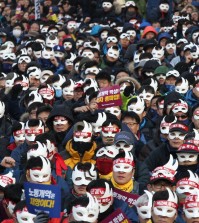- California Assembly OKs highest minimum wage in nation
- S. Korea unveils first graphic cigarette warnings
- US joins with South Korea, Japan in bid to deter North Korea
- LPGA golfer Chun In-gee finally back in action
- S. Korea won’t be top seed in final World Cup qualification round
- US men’s soccer misses 2nd straight Olympics
- US back on track in qualifying with 4-0 win over Guatemala
- High-intensity workout injuries spawn cottage industry
- CDC expands range of Zika mosquitoes into parts of Northeast
- Who knew? ‘The Walking Dead’ is helping families connect
‘Makgeolli’ ad appear on WSJ front page

Korea’s hallyu actor Song Il-gook is posing with a bowl of makgeolli in its recent ad published by Wall Street Journal’s Europe edition. (yonhap)
By Ko Dong-hwan
The ad features Korean actor Song Il-gook sporting a white hanbok and offering a bowl of the rice-fermented liquor to its viewers with the copy phrase “MAKGEOLLI?” American daily Wall Street Journal’s Europe edition published on Monday a front page ad for Korea’s traditional liquor “makgeolli.”
The sources told the ad was directed by Sungshin Women’s University professor Seo Kyoung-duk, 40, also known as the popular hallyu campaigner working mainly overseas.
Song made his appearance to the ad as a talent donation, while the Ministry of Agriculture, Food and Rural Affairs covered the ad’s production costs.
Prof. Seo wrote on his Facebook Monday how he feels about having unveiled the Korean rice wine through a European journalism medium for the first time.
“I wanted to promote the representative Korean liquor, just like beer for Germany and sake for Japan,” said Prof. Seo on his SNS webpage.
“Today requires us to industrialize our hallyu cultural contents more than ever. I hope this ad somehow helps boost our country’s exports to European nations.”
Prof. Seo wrote the ad is set for publication in Middle Eastern and North African regions as well, the sources added.
“As you travel the world, you notice that Japanese people look for our liquor in local eateries by ordering ‘mak-koli’ and Chinese people purchase it in local retailers,” said Seo.
The sources also cited Song who said that he had heard today’s makgeolli exports aren’t as prospective as they used to be.
“I wished to contribute to the promotion of the liquor so that it does well not only in Asia but across Europe as well,” said Song.
The recent ad is the second for the liquor to be printed in WSJ. It was first printed on the newspaper’s Asia edition in May 2013 with similar contents.












![일본 사도광산 [서경덕 교수 제공. 재판매 및 DB 금지]](http://www.koreatimesus.com/wp-content/uploads/2024/07/PYH2024072610800050400_P4-copy-120x134.jpg)


